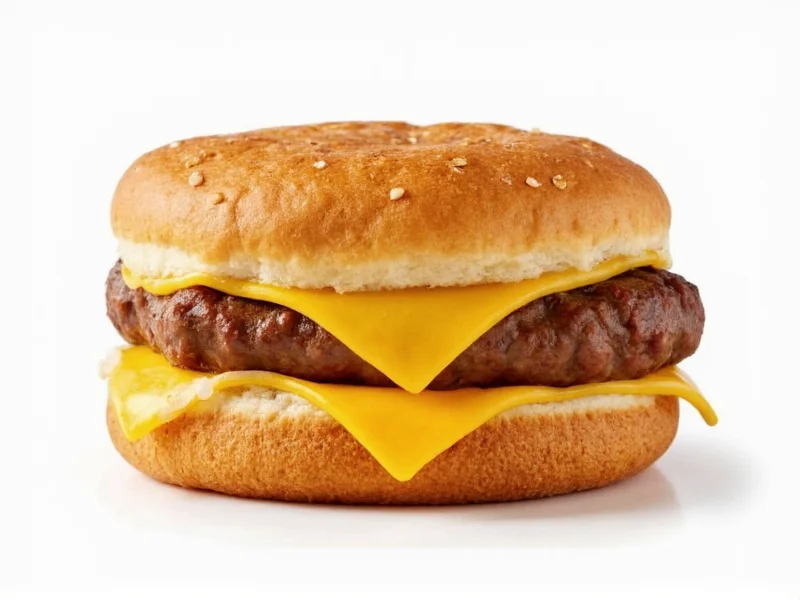Understanding the nutritional profile of fast food breakfast options is essential for making informed dietary choices. McDonald's sausage biscuit remains one of the chain's most popular morning menu items, but its calorie content warrants consideration for those monitoring their daily intake.
Nutritional Breakdown of McDonald's Sausage Biscuit
While calories provide a basic metric, examining the complete nutritional profile offers more valuable insights for health-conscious consumers. The standard sausage biscuit delivers significant amounts of protein and fat, but also contains notable sodium levels.
| Nutrient | Amount | % Daily Value* |
|---|---|---|
| Calories | 450 | 23% |
| Total Fat | 32g | 41% |
| Saturated Fat | 12g | 60% |
| Trans Fat | 0.5g | - |
| Cholesterol | 65mg | 22% |
| Sodium | 1100mg | 48% |
| Total Carbohydrates | 27g | 10% |
| Dietary Fiber | 1g | 4% |
| Sugars | 2g | - |
| Protein | 15g | - |
*Percent Daily Values are based on a 2,000 calorie diet. Your daily values may be higher or lower depending on your calorie needs.
Menu Variations and Calorie Differences
McDonald's offers several variations of their sausage biscuit that affect the overall calorie count. Understanding these differences helps customers make more precise dietary choices when ordering breakfast.
The sausage egg biscuit, which adds a folded egg to the standard recipe, increases the calorie count to approximately 520 calories. This popular combination provides additional protein but also adds fat and sodium to the meal.
For those seeking larger portions, the big breakfast biscuit with sausage contains about 560 calories. This version features a larger sausage patty and additional ingredients that boost both the calorie and protein content.
Contextualizing the Calorie Count
Placing the 450 calories of a standard sausage biscuit in context helps understand its impact on daily nutritional goals. For adults following a standard 2,000-calorie diet, this single breakfast item represents approximately 22.5% of daily calorie needs.
The high saturated fat content (60% of daily value) deserves particular attention, as excessive saturated fat intake correlates with increased cardiovascular risk according to dietary guidelines. Similarly, the 48% daily value for sodium means this single item contains nearly half the recommended maximum sodium intake for an entire day.
Nutritionists generally recommend that breakfast should provide 20-25% of daily calories. While the sausage biscuit falls within this range calorie-wise, its nutritional profile leans heavily toward fats rather than balanced macronutrients.
Comparing McDonald's Breakfast Options
When evaluating the nutritional value of the sausage biscuit, comparing it to other McDonald's breakfast menu items provides helpful perspective for making informed choices.
| Menu Item | Calories | Protein (g) | Total Fat (g) |
|---|---|---|---|
| Sausage Biscuit | 450 | 15 | 32 |
| Egg McMuffin | 300 | 18 | 12 |
| Sausage McGriddle | 540 | 15 | 27 |
| Hash Browns | 140 | 2 | 8 |
| Fruit & Maple Oatmeal | 320 | 5 | 5 |
This comparison reveals that while the sausage biscuit provides moderate protein, it contains significantly more fat than alternatives like the Egg McMuffin. Those seeking lower-calorie breakfast options at McDonald's might consider the Egg McMuffin or pairing a smaller item with fruit options.
Dietary Considerations for Specific Health Goals
For individuals following specific dietary patterns, the McDonald's sausage biscuit presents particular considerations. Those managing weight should note that the 450 calories represent a substantial portion of a typical weight-loss calorie budget.
Low-carb dieters will find the 27g of carbohydrates relatively moderate compared to other fast food breakfast options, though the minimal fiber content (1g) means most carbs come from refined flour. The 15g of protein provides reasonable satiety, though the high fat content may not align with certain dietary approaches.
Individuals monitoring cholesterol should consider the 65mg content, which represents over 20% of recommended daily limits. Those with hypertension or sodium restrictions should be particularly cautious due to the 1,100mg sodium content.
Strategies for Healthier Ordering
For regular McDonald's breakfast customers who enjoy the sausage biscuit but want to reduce calorie intake, several practical modifications can help. Ordering the biscuit without the sausage reduces calories significantly, though this eliminates the primary protein source.
Another approach involves pairing a smaller menu item with a side of fruit. For example, ordering just the egg portion of the sausage egg biscuit (approximately 100 calories) alongside the fruit parfait creates a more balanced meal under 300 calories.
When choosing the full sausage biscuit, consuming half can provide the flavor experience while reducing calorie intake to approximately 225 calories. Pairing this with black coffee or water instead of sugary beverages completes a more moderate breakfast option.
Understanding Fast Food Nutrition Information
It's important to recognize that nutrition facts for fast food items like the McDonald's sausage biscuit can vary slightly based on preparation methods and regional differences. The values provided represent averages from McDonald's official nutrition documentation.
Nutritional content may differ in international markets due to recipe variations and local ingredient sourcing. Additionally, customizations requested at the register can significantly alter the nutritional profile from the standard values.
For the most accurate tracking, consumers should consult the most current nutrition information directly from McDonald's official resources, as recipes and ingredients may change over time.











 浙公网安备
33010002000092号
浙公网安备
33010002000092号 浙B2-20120091-4
浙B2-20120091-4